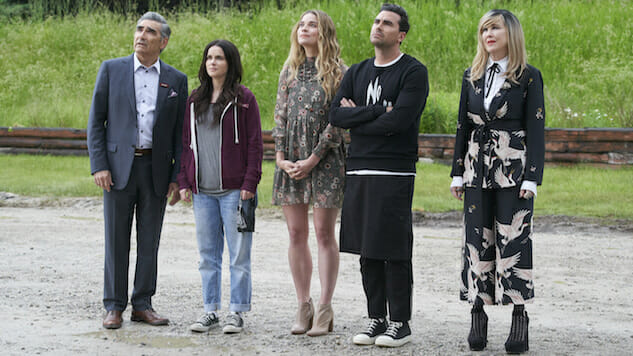The Sweetening of Schitt’s Creek
Photo: Pop TV
I’d intended this column to focus on Moira. Catherine O’Hara’s former soap star, with a wardrobe of whites, blacks, and slate grays in a woozy array of textures and patterns, sporting so much costume jewelry that one fears she’s going to throw out her back, might be a walking Magic Eye image of Harry Winston’s work bench. Or, for that matter, a Dr. Frankenstein voice coach’s bungled experiment: Her accent skates uncertainly through American, Canadian, and British registers, and that’s when she’s not test-driving her Cockney to buy a used car. The narcissistic matriarch of the spoiled Rose clan, stripped of their fortune and plopped down in the rural burg of Schitt’s Creek, Moira—as played by O’Hara, dressed by costume designer Debra Hanson, and written by Schitt’s Creek co-creator Dan Levy and his team—was, for the series’ first two seasons, the main reason to tune in; she’s high camp catnip (“What is your favorite season?” “Awards.”) with a wig collection that qualifies as the best drama on television.
And then something happened. Johnny Rose (Eugene Levy), once the owner of a successful chain of video stores, rediscovered his purpose running a motel. Moira won a seat on the town council. Their son, David (Dan Levy), opened a store and met a man. Their daughter, Alexis (Annie Murphy), finally finished high school (it’s a long story) and decided to enroll in community college. In Seasons Three and now Four, the Roses put down roots, and as they have, the people of Schitt’s Creek—once treated primarily as rubes, innocently getting in the way of the family’s plans to flee back to their former lives—have learned to wrangle the Roses, in some cases by developing sharper edges of their own. Though it hasn’t lost its absurdist inflection, what began as a fish-out-of-water comedy about a bunch of snobs reduced to eating mozzarella sticks at the Café Tropical has become a gentler, warmer, more complicated tale of what happens when the fish sprout legs: Call it the sweetening of Schitt’s Creek.
The plots remain as farcical as ever: In the Season Four premiere, Johnny stages an impromptu vodka-and-cinnamon-rolls get-together for the motel’s guests to distract from the removal of a dead body in one of the rooms; an upcoming episode finds Moira preparing for an anti-asbestos benefit concert, unsure whether to perform a number about Imelda Marcos, Patty Hearst, or conjoined twins. Of the last of these, she warbles, “the Foxwoods Casino Gazette did say it was a performance they’d never seen before,” and though the same doesn’t quite apply to Schitt’s Creek, its savvy remix of otherwise familiar features has grown on me. Levy and the brilliant O’Hara are the main draw, of course, one bumbling and one preening, both as confidently funny as in any of their collaborations with Christopher Guest, but it’s the mordant writing that keeps the whole thing afloat. As with Difficult People, the demise of which leaves Schitt’s Creek as perhaps the gayest comedy on TV, the series’ voice is, so to speak, “Extremely Online”—it’s peppered with Alexis’ name-dropping (e.g., “I stole this dress from Ashlee Simpson”) and David’s high-fashion ambitions (e.g. “I look to, like, Gwyneth, who soft-launched the Goop newsletter, and now it’s a thriving lifestyle publication slash empire”), all knowingly delivered in the airheaded upspeak of “brand ambassadors” and “social media influencers” and Instagram wellness gurus. In its way, actually, this is Schitt’s Creek’s canniest class satire: It understands that most of the canards applied to “millennials” are as much a function of one’s social status as one’s Facebook status, that only the affluent, or recently so, can commit time and resources to cultivating pristine digital personas.
-

-

-

-

-

-

-

-

-

-

-

-

-

-

-

-

-

-

-

-

-

-

-

-

-

-

-

-

-

-

-

-

-

-

-

-

-

-

-

-








































